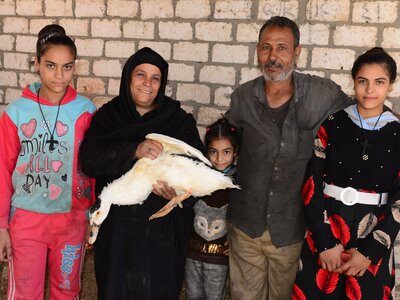Egypt
- 21%
- of population living in poverty
- 49%
- of households are without sufficient access to food
- 107.5 million
- population
With a growing population of more than 107 million, Egypt is the most populous country in North Africa and the Arab world, and an influential geopolitical actor in the region.
While maintaining positive economic growth, Egypt faces a complex economic landscape, with challenges related to inflation, currency devaluation and the impact of global and regional crises. "Multidimensional" poverty affects 21 percent of the population.
According to the 2024 Global Hunger Index, Egypt sustains a moderate level of food insecurity, ranking 63 out of 127 countries. Food affordability, quality and safety remain challenges due to a reliance on global markets for more than half of its staples.
Malnutrition is another public health concern, with 6.5 percent of children under 5 years suffering from stunting or wasting.
The World Food Programme (WFP) uses an integrated rural development approach to complement the Government’s Haya Kareema (Decent Life) initiative, which aims to support the poorest rural communities within the framework of Egypt Vision 2030.
WFP activities include school meals, nutrition, women and young people’s economic empowerment, climate-smart agriculture, capacity strengthening, and assistance for refugees and Egyptian host communities.
What the World Food Programme is doing in Egypt
-
Refugees and crisis-affected populations
-
As of April 2025, more than 1.5 million Sudanese fleeing the Sudan crisis had arrived in Egypt. The country hosts more than 902,000 registered refugees. WFP supports them and other crisis-affected people through monthly cash assistance. Additionally, to foster long-term self-reliance and social cohesion, WFP offers a skills development and vocational training programme to refugees, Sudanese crisis-affected people and Egyptians within host communities. WFP provides pregnant and breastfeeding refugee women with monthly cash, conditional on regular health check-ups, as well as nutrition-awareness sessions.
-
Youth and women's empowerment
-
Resilience building
-
School meals
-
Nutrition
-
Country capacity strengthening
Egypt news releases
Go to pagePartners and donors
View allFind out more about the state of food security in Egypt
Visit the food security analysis pageOperations in Egypt
Contacts
Office
49 Street 105, Hadaek El Maadi,
Cairo
Egypt







